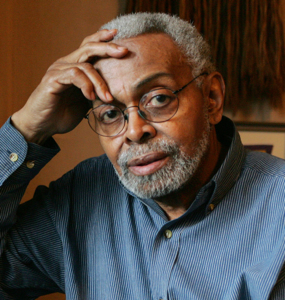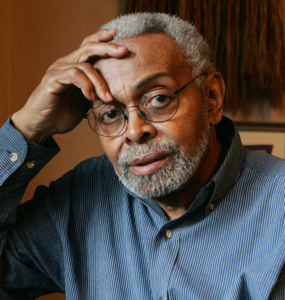

Amiri Baraka was born Everett LeRoi Jones in Newark, New Jersey, on October 7, 1934. His father, Colt LeRoy Jones, was a postal supervisor; Anna Lois Jones, his mother, was a social worker. He attended Rutgers University for two years, then transferred to Howard University, where in 1954 he earned his BA in English. His increasing hostility toward and mistrust of white society was reflected in two plays, The Slave and The Toilet, both written in 1962. His reputation as a playwright was established with the production of Dutchman at the Cherry Lane Theatre in New York on March 24, 1964. The play subsequently won an Obie Award (for “best off-Broadway play”) and was made into a film.
In 1965, following the assassination of Malcolm X, Jones repudiated his former life and ended his marriage. He moved to Harlem, where he founded the Black Arts Repertory Theatre/School. The company, which produced plays that were often anti-white and intended for a black audience, dissolved in a few months. He moved back to Newark, and in 1967 he married poet Sylvia Robinson (now known as Amina Baraka). That year he also founded the Spirit House Players, which produced, among other works, two of Baraka’s plays against police brutality: Police and Arm Yrself or Harm Yrself.
In 1968, he co-edited Black Fire: An Anthology of Afro-American Writing with Larry Neal and his play Home on the Range was performed as a benefit for the Black Panther party. That same year he became a Muslim, changing his name to Imamu Amiri Baraka. (“Imamu” means “spiritual leader.”) He assumed leadership of his own black Muslim organization, Kawaida. From 1968 to 1975, Baraka was chairman of the Committee for Unified Newark, a black united front organization. In 1969, his Great Goodness of Life became part of the successful “Black Quartet” off-Broadway, and his play Slave Ship was widely reviewed.
In 1974 Baraka adopted a Marxist Leninist philosophy and dropped the spiritual title “Imamu.” In 1983, he and Amina Baraka edited Confirmation: An Anthology of African-American Women, which won an American Book Award from the Before Columbus Foundation, and in 1987 they published The Music: Reflections on Jazz and Blues. The Autobiography of LeRoi Jones/Amiri Baraka was published in 1984.
Amiri Baraka’s numerous literary prizes and honors include fellowships from the Guggenheim Foundation and the National Endowment for the Arts, the PEN/Faulkner Award, the Rockefeller Foundation Award for Drama, the Langston Hughes Award from the City College of New York, and a lifetime achievement award from the Before Columbus Foundation.
He taught poetry at the New School for Social Research in New York, literature at the University of Buffalo, and drama at Columbia University. He also taught at San Francisco State University, Yale University and George Washington University.
